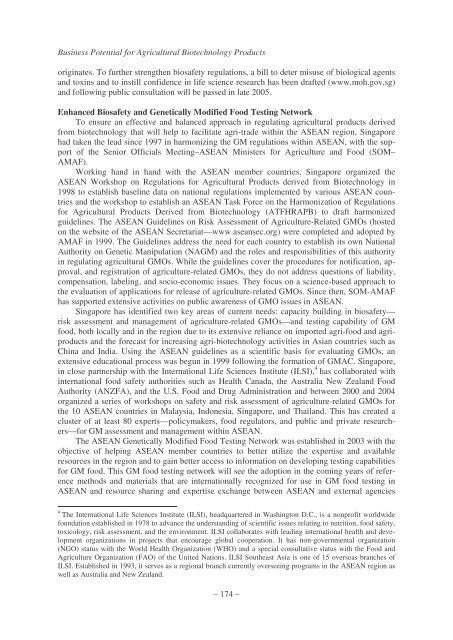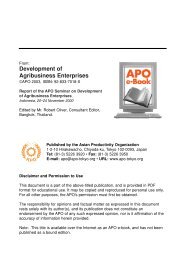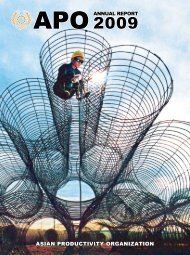Business Potential for Agricultural Biotechnology - Asian Productivity ...
Business Potential for Agricultural Biotechnology - Asian Productivity ...
Business Potential for Agricultural Biotechnology - Asian Productivity ...
You also want an ePaper? Increase the reach of your titles
YUMPU automatically turns print PDFs into web optimized ePapers that Google loves.
<strong>Business</strong> <strong>Potential</strong> <strong>for</strong> <strong>Agricultural</strong> <strong>Biotechnology</strong> Products<br />
originates. To further strengthen biosafety regulations, a bill to deter misuse of biological agents<br />
and toxins and to instill confidence in life science research has been drafted (www.moh.gov.sg)<br />
and following public consultation will be passed in late 2005.<br />
Enhanced Biosafety and Genetically Modified Food Testing Network<br />
To ensure an effective and balanced approach in regulating agricultural products derived<br />
from biotechnology that will help to facilitate agri-trade within the ASEAN region, Singapore<br />
had taken the lead since 1997 in harmonizing the GM regulations within ASEAN, with the support<br />
of the Senior Officials Meeting–ASEAN Ministers <strong>for</strong> Agriculture and Food (SOM–<br />
AMAF).<br />
Working hand in hand with the ASEAN member countries, Singapore organized the<br />
ASEAN Workshop on Regulations <strong>for</strong> <strong>Agricultural</strong> Products derived from <strong>Biotechnology</strong> in<br />
1998 to establish baseline data on national regulations implemented by various ASEAN countries<br />
and the workshop to establish an ASEAN Task Force on the Harmonization of Regulations<br />
<strong>for</strong> <strong>Agricultural</strong> Products Derived from <strong>Biotechnology</strong> (ATFHRAPB) to draft harmonized<br />
guidelines. The ASEAN Guidelines on Risk Assessment of Agriculture-Related GMOs (hosted<br />
on the website of the ASEAN Secretariat—www.aseansec.org) were completed and adopted by<br />
AMAF in 1999. The Guidelines address the need <strong>for</strong> each country to establish its own National<br />
Authority on Genetic Manipulation (NAGM) and the roles and responsibilities of this authority<br />
in regulating agricultural GMOs. While the guidelines cover the procedures <strong>for</strong> notification, approval,<br />
and registration of agriculture-related GMOs, they do not address questions of liability,<br />
compensation, labeling, and socio-economic issues. They focus on a science-based approach to<br />
the evaluation of applications <strong>for</strong> release of agriculture-related GMOs. Since then, SOM-AMAF<br />
has supported extensive activities on public awareness of GMO issues in ASEAN.<br />
Singapore has identified two key areas of current needs: capacity building in biosafety—<br />
risk assessment and management of agriculture-related GMOs—and testing capability of GM<br />
food, both locally and in the region due to its extensive reliance on imported agri-food and agriproducts<br />
and the <strong>for</strong>ecast <strong>for</strong> increasing agri-biotechnology activities in <strong>Asian</strong> countries such as<br />
China and India. Using the ASEAN guidelines as a scientific basis <strong>for</strong> evaluating GMOs, an<br />
extensive educational process was begun in 1999 following the <strong>for</strong>mation of GMAC. Singapore,<br />
in close partnership with the International Life Sciences Institute (ILSI), 4 has collaborated with<br />
international food safety authorities such as Health Canada, the Australia New Zealand Food<br />
Authority (ANZFA), and the U.S. Food and Drug Administration and between 2000 and 2004<br />
organized a series of workshops on safety and risk assessment of agriculture-related GMOs <strong>for</strong><br />
the 10 ASEAN countries in Malaysia, Indonesia, Singapore, and Thailand. This has created a<br />
cluster of at least 80 experts—policymakers, food regulators, and public and private researchers—<strong>for</strong><br />
GM assessment and management within ASEAN.<br />
The ASEAN Genetically Modified Food Testing Network was established in 2003 with the<br />
objective of helping ASEAN member countries to better utilize the expertise and available<br />
resources in the region and to gain better access to in<strong>for</strong>mation on developing testing capabilities<br />
<strong>for</strong> GM food. This GM food testing network will see the adoption in the coming years of reference<br />
methods and materials that are internationally recognized <strong>for</strong> use in GM food testing in<br />
ASEAN and resource sharing and expertise exchange between ASEAN and external agencies<br />
4 The International Life Sciences Institute (ILSI), headquartered in Washington D.C., is a nonprofit worldwide<br />
foundation established in 1978 to advance the understanding of scientific issues relating to nutrition, food safety,<br />
toxicology, risk assessment, and the environment. ILSI collaborates with leading international health and development<br />
organizations in projects that encourage global cooperation. It has non-governmental organization<br />
(NGO) status with the World Health Organization (WHO) and a special consultative status with the Food and<br />
Agriculture Organization (FAO) of the United Nations. ILSI Southeast Asia is one of 15 overseas branches of<br />
ILSI. Established in 1993, it serves as a regional branch currently overseeing programs in the ASEAN region as<br />
well as Australia and New Zealand.<br />
– 174 –
















